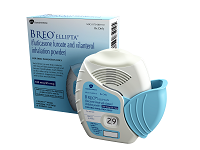The more researchers know about patient adherence to drugs, the better they can adapt products to keep patients compliant--which, in turn, helps pad sales. Makers of respiratory drugs have picked up on that lately, and now, GlaxoSmithKline ($GSK) is the latest to forge an adherence-minded technology deal.
 On Tuesday, Wisconsin-based Propeller Health announced a development agreement with the British drug giant under which Propeller will create a custom sensor for Glaxo's Ellipta inhaler. The sensor--to be used in clinical studies in asthma and COPD--will automatically collect and record data on the date and time of each use of the inhaler and send that data straight to GSK's investigators for analysis, Propeller said.
On Tuesday, Wisconsin-based Propeller Health announced a development agreement with the British drug giant under which Propeller will create a custom sensor for Glaxo's Ellipta inhaler. The sensor--to be used in clinical studies in asthma and COPD--will automatically collect and record data on the date and time of each use of the inhaler and send that data straight to GSK's investigators for analysis, Propeller said.
Using the sensor tech "will advance our understanding of disease and inform our decision-making in the development of new medicines," Dave Allen, GSK's SVP of respiratory R&D, said in a statement--and the company won't be the first respiratory player to benefit from such findings. Back in 2013, Propeller inked a similar pact with Glaxo rival Boehringer Ingelheim, mobihealthnews reports, and others in the field have made their own tech moves, too. Teva ($TEVA), for one, recently nabbed Massachusetts' Gecko Health Innovations, while Symbicort-maker AstraZeneca ($AZN) is working with New Zealand's Adherium, the publication notes.
And while this is Glaxo's first encounter with the smart inhaler field, it's not Propeller's first encounter with Glaxo's inhalers. Propeller previously developed a sensor for GSK's Diskus inhaler, winning FDA clearance last July to sell it--but it did so without teaming up with the company.
Glaxo's Ellipta products--including newcomers Breo and Anoro--could certainly use any boost the new collaboration can provide. Right now, the company's pharma unit is suffering through the decline of Advair, a behemoth asthma/COPD med that's being hit by generics in Europe and payer pressure in the U.S. And while the drugmaker has a slew of new products in the space, it remains to be seen how much of Advair's sales haul--which totaled $8.25 billion in 2013--they can cover.
Meanwhile, it's not just respiratory drugmakers who are looking to adherence devices to help gain an edge. In September, partners Proteus Digital Health and Otsuka submitted an application to the FDA for a device that embeds Proteus' ingestible sensor into Otsuka's antipsychotic Abilify, allowing patients, physicians and caregivers to monitor how an individual takes the drug.
- read Propeller's release
- get more from mobihealthnews
Special Reports: The top 15 pharma companies by 2014 revenue - GlaxoSmithKline | The 10 best-selling drugs of 2013 - Advair/Seretide